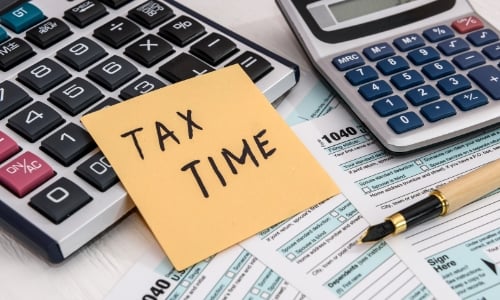
Get ahead of your taxes each year by preparing for April 15 - it will be here sooner than you realize. It’s in your best interest to start tax preparation before that deadline. Whether you're filing taxes for the first time or you're a seasoned veteran, you'll want to keep some helpful tips in mind.
Start planning now
Let's face it, filing your tax returns is probably the task furthest from your mind. But the reality is that the spring deadline will be here sooner than you know it. You don't want to put yourself in a position of rushing to file your tax return because you decided to wait until the last minute. Procrastination means you might forget about accounting for an important financial document or missing out on saving money because you didn't claim a particular deduction.
Now is the time to start thinking about what you'll need to do to file your taxes. Here's a checklist to help organize and prepare for tax season
Step 1: Gather personal information
The most important information you should start collecting is for yourself and family. You'll need the birth dates and Social Security information for yourself, your spouse, and any dependents.
Step 2: Decide how you'll file your taxes
You can either file your taxes on your own using one of the many software options available, or you can enlist the help of a professional.
You should consider seeking the help of an accountant if you have experienced a major life change such as marriage, divorce, or becoming a parent.
You'll also want to consider seeking the help of an accountant if you purchased a home within the last year. Once you become a homeowner, your tax burden drastically changes, so you'll need to make sure you have all of your bases covered. Accountants will also help you take advantage of credits and deductions, such as the mortgage tax credit.
Finally, you'll want to work with an accountant if you're self-employed or own your own business. Tax obligations are different if you own a business, a professional will make sure you don't make any mistakes while also calculating how much you'll likely need to pay in taxes.
If you're going to be filing taxes on your own, consider using one of the following programs:
- TurboTax
- H&R Block
- TaxAct
- TaxSlayer
- Jackson Hewitt
- FreeTaxUSA
Another perk of thinking about taxes now is you'll be able to research the above filing options, and determine which program is best for you.
Step 3: Gather income documents
You can't file your taxes if you don't have important financial information at your disposal. Make sure you receive the necessary paperwork from your employers and other financial accounts under your name.
Your W2 is one of the most important pieces of information you'll need. If you worked for multiple employers in the past year, you should receive a W2 from each.
If you're a freelancer, you'll need to organize your Form 1099 documents, in addition to collecting business expenses that you may be able to deduct.
Other income information you'll want to start collecting may include:
- Alimony.
- Investment income.
- Rental property income and expenses.
- Social Security benefits.
- Individual Retirement Account distribution.
- Miscellaneous income (jury duty, scholarships, gambling winnings).
Step 4: Gather adjustments to your income documents
No one actually likes paying taxes, which is why you should find as many ways possible to reduce your taxable income. To do this, you'll need to collect income adjustments. These may encompass some of the following, according to TurboTax:
- Student loan interest.
- Moving expenses.
- Child and Dependent Care Tax Credit.
- Mortgage points.
By collecting the above information, you'll lower your tax burden and may even increase the size of your refund check.
Step 5: Start looking at credits and deductions
The IRS has a number of tax credits and deductions you can claim. You'll want to review these so you have an idea which ones can help you save money.
For example, if your income is considered low to moderate, you may be able to claim the Earned Income Tax Credit, which reduces the amount of tax you owe.
It's important you look over credits and deductions because some have specific requirements. You may need to fill out additional forms, such as Form 8829 if you're claiming the Home Office deduction.
Filing taxes requires a lot more work than you may realize. Start organizing your finances ahead of time so you can file taxes well before the April deadline. You'll be glad you did.